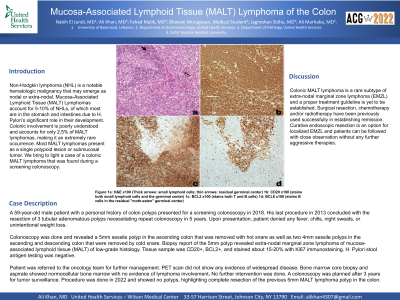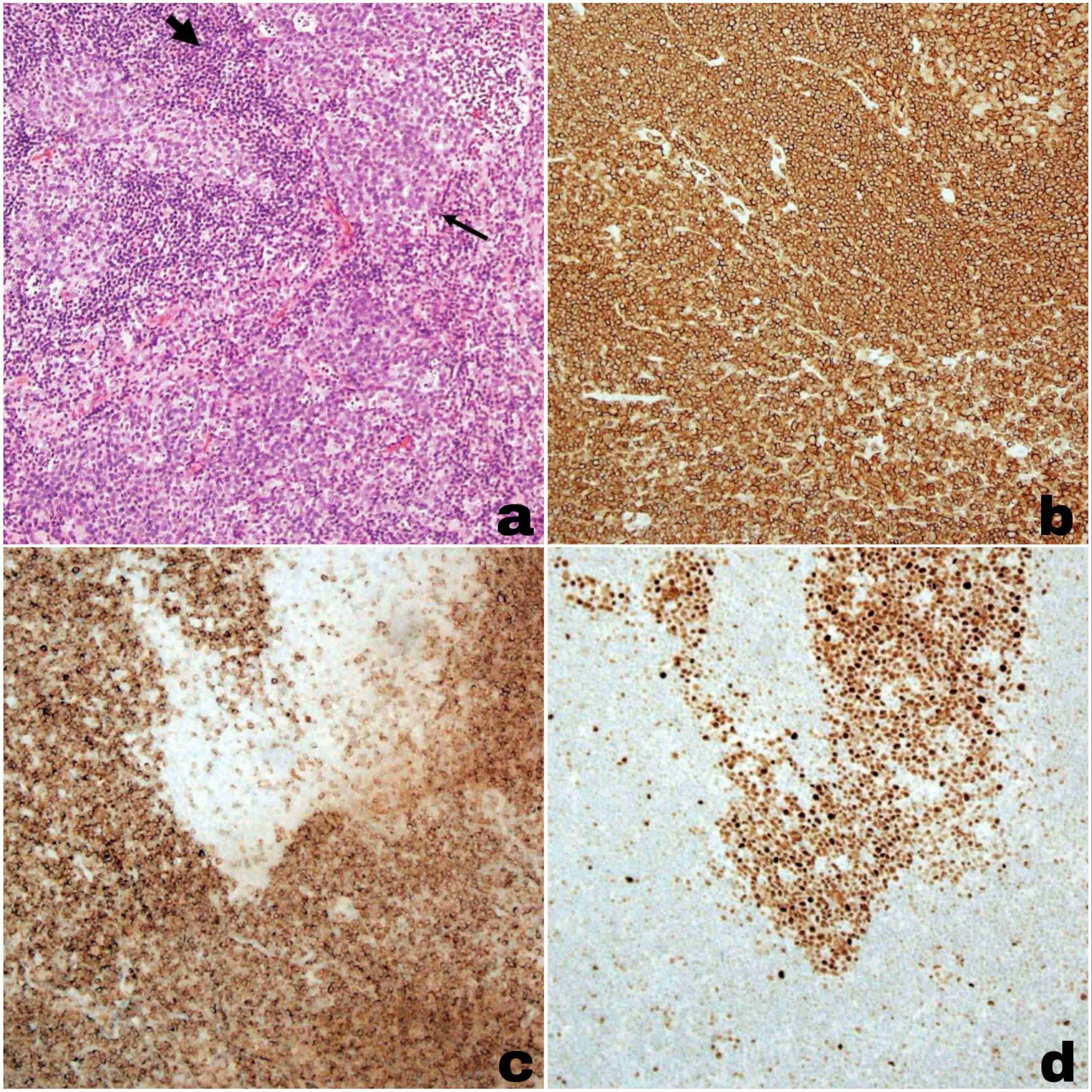Back

Poster Session C - Monday Afternoon
Category: Colon
C0136 - Mucosa-Associated Lymphoid Tissue (MALT) Lymphoma of the Colon
Monday, October 24, 2022
3:00 PM – 5:00 PM ET
Location: Crown Ballroom

- AK
Ali Khan, MD
United Health Services Hospital
Johnson City, NY
Presenting Author(s)
Nabih El Jundi, MD1, Ali Khan, MD2, Bhavani G. Murugesan, 3, Fahad Malik, MD4, Jagmohan Sidhu, MD5, Ali Marhaba, MD5
1United Health Services, Johnson City, NY; 2United Health Services Hospital, Johnson City, NY; 3SUNY Upstate, Johnson City, NY; 4United Health Services- Wilson Hospital, Binghamton, NY; 5United Health Services, Binghamton, NY
Introduction: Non-Hodgkin lymphoma (NHL) is a notable hematologic malignancy that may emerge as nodal or extra-nodal. Mucosa-Associated Lymphoid Tissue (MALT) Lymphomas account for 5-10% of NHLs, of which most are in the stomach and intestines due to H. Pylori’s significant role in their development. Colonic involvement is poorly understood and accounts for only 2.5% of MALT lymphomas, making it an extremely rare occurrence. Most MALT lymphomas present as a single polypoid lesion or submucosal tumor. We bring to light a case of a colonic MALT lymphoma that was found during a screening colonoscopy.
Case Description/Methods: A 59-year-old male patient with a personal history of colon polyps presented for a screening colonoscopy in 2018. His last procedure in 2013 concluded with the resection of 3 tubular adenomatous polyps necessitating repeat colonoscopy in 5 years. Upon presentation, patient denied any fever, chills, night sweats, or unintentional weight loss.
Colonoscopy was done and revealed a 5mm sessile polyp in the ascending colon that was removed with hot snare as well as two 4mm sessile polyps in the ascending and descending colon that were removed by cold snare. Biopsy report of the 5mm polyp revealed extra-nodal marginal zone lymphoma of mucosa-associated lymphoid tissue (MALT) of low-grade histology. Tissue sample was CD20+, BCL2+, and stained about 15-20% with Ki67 immunostaining. H. Pylori stool antigen testing was negative.
Patient was referred to the oncology team for further management. PET scan did not show any evidence of widespread disease. Bone marrow core biopsy and aspirate showed normocellular bone marrow with no evidence of lymphoma involvement. No further intervention was done. A colonoscopy was planned after 3 years for tumor surveillance. Procedure was done in 2022 and showed no polyps, highlighting complete resection of the previous 5mm MALT lymphoma polyp in the colon.
Discussion: Colonic MALT lymphoma is a rare subtype of extra-nodal marginal zone lymphoma (EMZL) and a proper treatment guideline is yet to be established. Surgical resection, chemotherapy and/or radiotherapy have been previously used successfully in establishing remission. Curative endoscopic resection is an option for localized EMZL and patients can be followed with close observation without any further aggressive therapies.

Disclosures:
Nabih El Jundi, MD1, Ali Khan, MD2, Bhavani G. Murugesan, 3, Fahad Malik, MD4, Jagmohan Sidhu, MD5, Ali Marhaba, MD5. C0136 - Mucosa-Associated Lymphoid Tissue (MALT) Lymphoma of the Colon, ACG 2022 Annual Scientific Meeting Abstracts. Charlotte, NC: American College of Gastroenterology.
1United Health Services, Johnson City, NY; 2United Health Services Hospital, Johnson City, NY; 3SUNY Upstate, Johnson City, NY; 4United Health Services- Wilson Hospital, Binghamton, NY; 5United Health Services, Binghamton, NY
Introduction: Non-Hodgkin lymphoma (NHL) is a notable hematologic malignancy that may emerge as nodal or extra-nodal. Mucosa-Associated Lymphoid Tissue (MALT) Lymphomas account for 5-10% of NHLs, of which most are in the stomach and intestines due to H. Pylori’s significant role in their development. Colonic involvement is poorly understood and accounts for only 2.5% of MALT lymphomas, making it an extremely rare occurrence. Most MALT lymphomas present as a single polypoid lesion or submucosal tumor. We bring to light a case of a colonic MALT lymphoma that was found during a screening colonoscopy.
Case Description/Methods: A 59-year-old male patient with a personal history of colon polyps presented for a screening colonoscopy in 2018. His last procedure in 2013 concluded with the resection of 3 tubular adenomatous polyps necessitating repeat colonoscopy in 5 years. Upon presentation, patient denied any fever, chills, night sweats, or unintentional weight loss.
Colonoscopy was done and revealed a 5mm sessile polyp in the ascending colon that was removed with hot snare as well as two 4mm sessile polyps in the ascending and descending colon that were removed by cold snare. Biopsy report of the 5mm polyp revealed extra-nodal marginal zone lymphoma of mucosa-associated lymphoid tissue (MALT) of low-grade histology. Tissue sample was CD20+, BCL2+, and stained about 15-20% with Ki67 immunostaining. H. Pylori stool antigen testing was negative.
Patient was referred to the oncology team for further management. PET scan did not show any evidence of widespread disease. Bone marrow core biopsy and aspirate showed normocellular bone marrow with no evidence of lymphoma involvement. No further intervention was done. A colonoscopy was planned after 3 years for tumor surveillance. Procedure was done in 2022 and showed no polyps, highlighting complete resection of the previous 5mm MALT lymphoma polyp in the colon.
Discussion: Colonic MALT lymphoma is a rare subtype of extra-nodal marginal zone lymphoma (EMZL) and a proper treatment guideline is yet to be established. Surgical resection, chemotherapy and/or radiotherapy have been previously used successfully in establishing remission. Curative endoscopic resection is an option for localized EMZL and patients can be followed with close observation without any further aggressive therapies.

Figure: Figure 1a: H&E x100 (Thick arrows: small lymphoid cells; thin arrows: residual germinal center)
1b: CD20 x100 (stains both small lymphoid cells and the germinal center)
1c: BCL2 x100 (stains both T and B cells)
1d: BCL6 x100 (stains B cells in the residual "moth-eaten" germinal center)
1b: CD20 x100 (stains both small lymphoid cells and the germinal center)
1c: BCL2 x100 (stains both T and B cells)
1d: BCL6 x100 (stains B cells in the residual "moth-eaten" germinal center)
Disclosures:
Nabih El Jundi indicated no relevant financial relationships.
Ali Khan indicated no relevant financial relationships.
Bhavani Murugesan indicated no relevant financial relationships.
Fahad Malik indicated no relevant financial relationships.
Jagmohan Sidhu indicated no relevant financial relationships.
Ali Marhaba indicated no relevant financial relationships.
Nabih El Jundi, MD1, Ali Khan, MD2, Bhavani G. Murugesan, 3, Fahad Malik, MD4, Jagmohan Sidhu, MD5, Ali Marhaba, MD5. C0136 - Mucosa-Associated Lymphoid Tissue (MALT) Lymphoma of the Colon, ACG 2022 Annual Scientific Meeting Abstracts. Charlotte, NC: American College of Gastroenterology.
